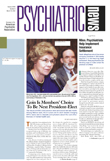Cuts totaling $2 million out of the $832 million Fiscal 2002 budget for the federal Center for Mental Health Services (CMHS) have resulted in outrage and dismay among consumer advocates.
Those cuts will terminate the activities of five technical assistance centers once the Fiscal 2001 funding is exhausted. Three of the centers—the National Empowerment Center in Massachusetts, the National Mental Health Consumers Self-Help Clearinghouse in Pennsylvania, and the Consumer Organization and Networking Technical Assistance Center (CONTAC) in West Virginia—are run by consumers.
Michael J. English, J.D., director of the Knowledge Development and Systems Change Division at CMHS, said the centers are intended to help consumers develop the skills to become effective change agents. They are part of a long-standing commitment at CMHS to consumer involvement in the mental health system (
see box on page 46).
The National Mental Health Association (NMHA) and the National Alliance for the Mentally Ill (NAMI) each operates a center that provides technical assistance to family members, friends, and others known as “consumer supporters,” as well as to consumers.
Other consumer-related programs hit by new budget constraints include Community Coalitions for the Prevention of Youth Violence (no new funding in 2002) and Community Action Grants and Mental Health Treatment in Non-Mental Health Settings (no new funding in 2003).
Why and Why Now?
One source of consternation is the lack of stated rationale for the terminations. Joseph Rogers, executive director of the National Mental Health Consumers’ Self-help Clearinghouse, told Psychiatric News, “We had no warning. The cuts just came out of the blue, and we’ve had no explanation since that makes any sense.”
He pointed out, in fact, that the spring 2001 issue of SAMHSA News highlighted the technical assistance centers in a four-page feature.
In addition, after a presentation about the work of the centers at its September 2001 meeting, the CMHS’s National Advisory Council (NAC) unanimously approved a recommendation from its Consumer/Survivor Subcommittee that CMHS continue funding support to the centers at current or higher levels. That endorsement of the centers was reaffirmed at the February meeting, after the cuts were announced.
NAC member Karina Uldall, M.D., an assistant professor in the department of psychiatry and behavioral sciences at the University of Washington’s School of Medicine, said, “Our voting record shows that NAC members think the technical assistance centers are vital to promoting culturally competent and clinically appropriate health care. The cuts perpetuate discrimination against people living with mental illness and fly in the face of efforts to encourage their independence.”
In the absence of information about who or what motivated the action, some advocates have speculated that the cuts were the result of lobbying by NAMI. David Oaks, director of Support Coalition International (SCI), said that on April 6, 2001, NAMI announced on its Web site that it was lobbying the Bush administration “to terminate federal funding” for certain “psychiatric survivor” organizations.
The full announcement read, “NAMI urges the Bush administration move to terminate federal support for nonprofit organizations that actively challenge the scientific basis for mental illness and its treatment or forward an ideology that undermines the role of families in treatment and recovery (particularly so-called ‘psychiatric survivor’ organizations) that promote an agenda hostile toward increasing access to mental illness treatment services.”
Within a few days, the statement was withdrawn by NAMI’s new executive director, Richard C. Birkel. Birkel wrote to Oaks, who had requested a meeting, saying that NAMI had not and would not “engage in actively discouraging federal funding for any groups simply because we disagree with them.”
NAMI spokesperson Bob Carolla told Psychiatric News that NAMI had not exerted pressure to promote the cuts. On February 2 Birkel wrote to HHS Secretary Tommy Thompson expressing disappointment with the funding freeze for many of CMHS’s programs and the termination of the technical assistance centers.
Impact of Cuts
Whatever the motivation, consumer advocates find the cuts particularly inexplicable in light of the need to move ahead with implementation of the Olmstead decision. That Supreme Court decision issued in 1999 interpreted the Americans With Disabilities Act (ADA) to require states to administer their programs in the most integrated setting appropriate to the needs of people with disabilities.
Brian Coopper, senior director of consumer advocacy at the National Mental Health Association (NMHA), told Psychiatric News, “We’ve been doing an incredible job just with crumbs, and now they want to take those crumbs away. It makes no sense, particularly since President Bush is pushing his New Freedom Initiative, which is intended to encourage independence for people with disabilities.”
Rogers said, “No less a government authority than the surgeon general, in his 1999 report, notes that consumer organizations ‘have invigorated the fields of research as well as treatment and service delivery design.’”
James E. Sabin, M.D., a clinical professor of psychiatry at the Harvard Medical School and director of the Ethics Program at Harvard Pilgrim Health Care, told Psychiatric News, “Psychiatrists have long acknowledged the value of such self-help groups as AA and NA. As a clinician, I’m dismayed by any action that would inhibit the growth of other effective self-help activities.”
In a Psychiatric Services article scheduled for the April issue, Sabin writes about the Leadership Academy. This program sparked the founding of CONTAC, one of the consumer-directed technical assistance centers. Using consumers as trainers, the academy offers advocacy-skills training in an atmosphere that encourages belief in the power of constructive activism and follows up with networking activities.
Sabin said, “To be effective, any health care system depends on active, informed involvement by consumers. Such involvement has been particularly difficult to bring about in the mental health system because of a long tradition of invalidating the views of people who receive services. The work of programs like CONTAC is important not only for the consumers, but for the mental health system and the country.”
The Web address of the Center for Mental Health Services is www.mentalhealth.org. That site has links to the technical assistance centers and other consumer organizations. ▪
